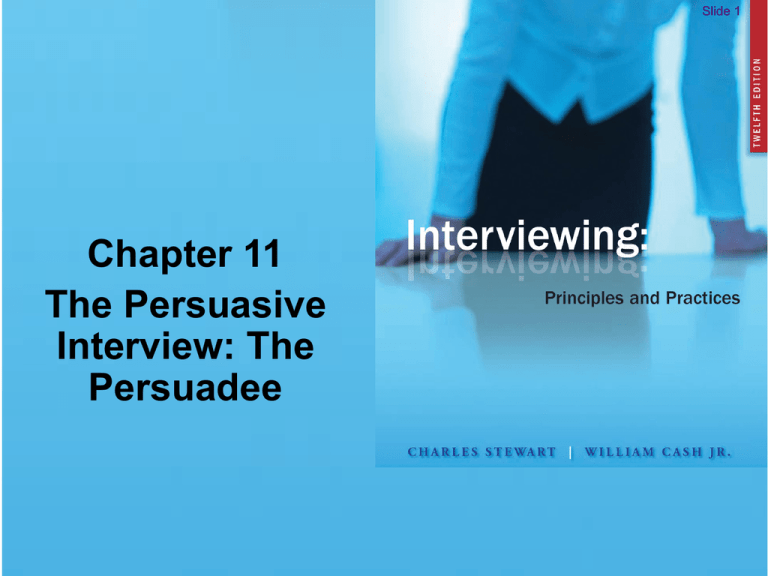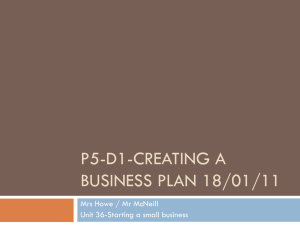
Slide 1
Chapter 11
The Persuasive
Interview: The
Persuadee
Chapter Summary
Be a Responsible Participant
Be an Informed Participant
Be an Active Participant
Summary
© 2009 The McGraw-Hill Companies, Inc. All rights reserved.
Be a Responsible Participant
• Both parties share ethical responsibilities
• Be honest
• Be fair
• Be skeptical
• Be thoughtful and deliberate in judgment
• Be open-minded
• Be responsive
© 2009 The McGraw-Hill Companies, Inc. All rights reserved.
Be an Informed Participant
Psychological Strategies
Standard/Learned Principles: We may act
automatically during persuasive interviews
Contrast Principle: Look for real differences
Rule of Reciprocation: We feel obligated to
return favors
Reciprocal Concessions: One concession
deserves another, or not
Rejection then Retreat strategy: Persuaders
may ask for a lot and settle for less
© 2009 The McGraw-Hill Companies, Inc. All rights reserved.
Be an Informed Participant
Language Strategies
Seek the meaning of symbols
Framing and Reframing
1.
Appealing to people
2.
3.
4.
The use of language to frame or construct the way we see
people, places, things, and objects.
For many, majority rules
Persuaders use the bandwagon tactic when they urge
others to follow the crowd.
Simplifying the Complex
Dodging the Issue
© 2009 The McGraw-Hill Companies, Inc. All rights reserved.
Be an Informed Participant
Logical Strategies
The ways persuaders attempt to reason with us:
1.
Reasoning from example or generalization
2.
Reasoning from cause-to-effect
3.
Reasoning from fact or hypothesis
4.
Reasoning from sign
5.
Reasoning from analogy or comparison
6.
Reasoning from accepted belief, assumption, or
proposition
7.
Reasoning from condition
8.
Reasoning from two choices
© 2009 The McGraw-Hill Companies, Inc. All rights reserved.
Be an Informed Participant
Evidence
Assess the reliability and expertise of sources.
Insist on both quantity and quality of evidence.
© 2009 The McGraw-Hill Companies, Inc. All rights reserved.
Be an Active Participant
The Opening
Be an active and critical player in the interview.
Play an active role in the opening because it
initiates the persuasive process.
© 2009 The McGraw-Hill Companies, Inc. All rights reserved.
Be an Active Participant
Creating a Need or Desire
Ask questions, challenge arguments, and demand
solid evidence.
© 2009 The McGraw-Hill Companies, Inc. All rights reserved.
Be an Active Participant
Establishing Criteria
Criteria enable you to weigh evidence.
© 2009 The McGraw-Hill Companies, Inc. All rights reserved.
Be an Active Participant
Presenting the Solution
Be sure the solution meets the need and is the
best available
© 2009 The McGraw-Hill Companies, Inc. All rights reserved.
Be an Active Participant
The Closing
Take your time when making a final decision
© 2009 The McGraw-Hill Companies, Inc. All rights reserved.
Summary
Good persuasive interviews involve the
interviewee as responsible, informed, critical,
and active participant who plays a central
role.
It is a mutual activity in which both parties
play active and critical roles.
Interviews are a chance for the interviewee to
act ethically, listen critically, raise important
objections, and recognize common tactics for
what they are.
© 2009 The McGraw-Hill Companies, Inc. All rights reserved.
Chapter 12
The Counseling
Interview
Chapter Summary
Preparing for the Counseling Interview
Structuring the Interview
Conducting the Interview
Summary
© 2009 The McGraw-Hill Companies, Inc. All rights reserved.
Preparing for the Counseling
Interview
Analyzing Self
Know yourself before trying to help others know
themselves.
Good problem solvers may be poor counselors.
Do not stray beyond your level of expertise.
© 2009 The McGraw-Hill Companies, Inc. All rights reserved.
Preparing for the Counseling
Interview
Analyzing the Interviewee
Be informed but keep an open mind.
Be aware of past, present, and future events.
Be prepared for rejections of offers to counsel.
Listen rather than talk.
© 2009 The McGraw-Hill Companies, Inc. All rights reserved.
Preparing for the Counseling
Interview
Selecting an Interviewing Approach
Directive Approach
Nondirective Approach
Combination of Approaches
© 2009 The McGraw-Hill Companies, Inc. All rights reserved.
Preparing for the Counseling
Interview
Selecting the Setting
Do not underestimate the importance of location
and seating.
A round table is a traditional arrangement for
problem solving.
© 2009 The McGraw-Hill Companies, Inc. All rights reserved.
Structuring the Interview
The Opening
Initial Comments and Reactions
Want to help and show it.
Be tactful but not indifferent.
Rapport and Orientation
Accept seemingly irrelevant opening comments.
If you are uncomfortable, the interviewee will be
uncomfortable.
© 2009 The McGraw-Hill Companies, Inc. All rights reserved.
Structuring the Interview
The Opening
Encouraging Self-Disclosure
Self-disclosure varies from person to person.
Work Within a Known Time Frame
© 2009 The McGraw-Hill Companies, Inc. All rights reserved.
Structuring the Interview
The Body of the Interview
Feelings play central roles in counseling
interviews.
Counseling interviews rarely progress in an
orderly manner.
Enable the interviewee to relate the problem.
© 2009 The McGraw-Hill Companies, Inc. All rights reserved.
Structuring the Interview
© 2009 The McGraw-Hill Companies, Inc. All rights reserved.
Structuring the Interview
Closing the Interview
Involve the interviewee as an active participant in
the closing.
Decide which leave-taking means is most
appropriate.
Be sincere and honest in the ways you close
interviews.
© 2009 The McGraw-Hill Companies, Inc. All rights reserved.
Structuring the Interview
Evaluating the Interview
Review all you did and did not do and accomplish.
How prepared were you for this interaction?
Which skills need more work? Preparation,
structuring, interviewing, or counseling?
© 2009 The McGraw-Hill Companies, Inc. All rights reserved.
STRUCTURING THE INTERVIEW
The Telephone Interview
Advantages
Inexpensive
Convenient
Preserves Anonymity
Gives Sense of Control
Disadvantages
Possible Inconvenient Time
Distractions
© 2009 The McGraw-Hill Companies, Inc. All rights reserved.
Conducting the Interview
Listening
Focus on the interviewee and the interviewee’s
problem.
Do not interrupt or take over the conversation.
© 2009 The McGraw-Hill Companies, Inc. All rights reserved.
Conducting the Interview
Observing
Look for nonverbal signals but interpret them
cautiously.
If you are taking notes, explain why.
Note that deceptive answers may be lengthier,
more hesitant, and characterized by long pauses.
© 2009 The McGraw-Hill Companies, Inc. All rights reserved.
Conducting the Interview
Questioning
Do not ask too many questions.
Keep your questions open-ended.
Phrase all questions with care.
© 2009 The McGraw-Hill Companies, Inc. All rights reserved.
Conducting the Interview
Responding and Informing
Client-Centered Approach: Focuses the interview on the
interviewee.
Highly Nondirective Reactions and Responses: Give
control to the interviewee.
Nondirective Reactions and Responses: Inform and
encourage.
Directive Reactions and Responses: Advise and
evaluate but do not dictate.
Highly Directive Reactions and Responses: Dictate
strong advice and actions.
© 2009 The McGraw-Hill Companies, Inc. All rights reserved.
Conducting the Interview
Responding and Informing: Tips
Responses are more nonverbal than verbal.
Silence has its limits.
Use questions that force the interviewee to formulate
answers and solutions.
Use questions to determine what a person is not saying.
A thoughtless comment or two can damage a relationship.
Exhaust all less directive means before dictating action.
© 2009 The McGraw-Hill Companies, Inc. All rights reserved.
Conducting the Interview
© 2009 The McGraw-Hill Companies, Inc. All rights reserved.
Summary
You take part in a counseling interview
whenever you try to help a person gain
insights into a problem.
Preparation helps to determine how to listen,
question, inform, explain, respond, and relate
to each interviewee.
Many suggestions but few rules apply to
counseling interviews.
© 2009 The McGraw-Hill Companies, Inc. All rights reserved.









